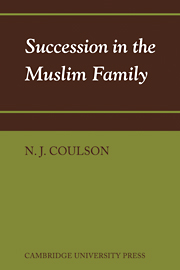Book contents
- Frontmatter
- Contents
- Introduction
- 1 Family ties as grounds of inheritance
- 2 Priorities in inheritance
- 3 Primary heirs
- 4 Substitute heirs
- 5 Secondary heirs
- 6 Grandfather and collaterals in competition
- 7 Succession by the outer family
- 8 Inheritance in Shīʻī law
- 9 Reforms in the traditional system of priorities
- 10 Dual relationships
- 11 Impediments to inheritance
- 12 Conditions of inheritance
- 13 Bequests
- 14 The limits of testamentary power
- 15 Death-sickness
- Index
- Frontmatter
- Contents
- Introduction
- 1 Family ties as grounds of inheritance
- 2 Priorities in inheritance
- 3 Primary heirs
- 4 Substitute heirs
- 5 Secondary heirs
- 6 Grandfather and collaterals in competition
- 7 Succession by the outer family
- 8 Inheritance in Shīʻī law
- 9 Reforms in the traditional system of priorities
- 10 Dual relationships
- 11 Impediments to inheritance
- 12 Conditions of inheritance
- 13 Bequests
- 14 The limits of testamentary power
- 15 Death-sickness
- Index
Summary
The original sources of the law of bequests
It is ordained for you that anyone who is at the point of death, and has goods to leave, should bequeath equitably to his parents and near relatives. This is an obligation upon the pious
(Qur'ān, 2, 180).Such of you as die leaving wives should bequeath to them maintenance for one year…
(Qur'ān, 2, 240).These Qurʾanic verses, the first of which is generally known as “the verse of bequests”, represent historically the first Islamic regulations on the subject of succession. They enjoin testamentary dispositions only, or at least primarily, as a means by which the deceased might make suitable provision for his surviving relatives; and for this reason the verses were generally held to be superseded and abrogated by the later Qurʾanic texts which laid down the rules of inheritance. The Qurʾanic rules of inheritance were never regarded as applying only in the case of persons who died wholly or partially intestate. The juristic consensus held that the general duty of the deceased to transmit his property to his relatives had become particularised; a permissive and discretionary system of succession to property at death had now been replaced by mandatory rules which prescribed the entitlement of the different relatives in terms of a fixed fractional share of the estate.
At the same time the Qur'ān itself clearly still allowed some power of testamentary disposition inasmuch as the shares of inheritance that it allotted were specifically described as portions of the residual estate left “after the payment of any bequests and debts”.
- Type
- Chapter
- Information
- Succession in the Muslim Family , pp. 213 - 234Publisher: Cambridge University PressPrint publication year: 1971

